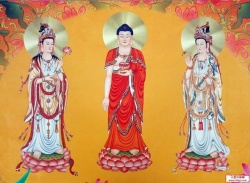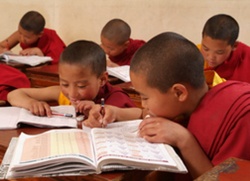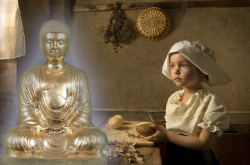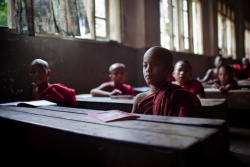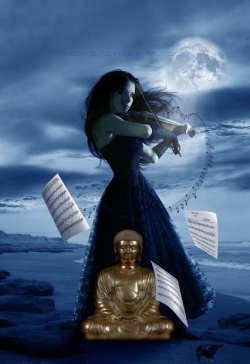Difference between revisions of "Definition of Mara"
| Line 1: | Line 1: | ||
| − | + | {{DisplayImages|4188|2913|3908|2745|3710}} | |
The defeat of [[Mara]] by {{Wiki|Prince}} [[Siddhartha]] | The defeat of [[Mara]] by {{Wiki|Prince}} [[Siddhartha]] | ||
| Line 13: | Line 13: | ||
| − | [[Definition of Mara]] | + | ===[[Definition of Mara]]=== |
| − | [[Khandha-mara]] | + | |
| + | ===[[Khandha-mara]]== | ||
[[Five aggregates]] ([[Rupa]] ([[Form]]), [[Vedana]] ([[feeling]]), [[Saññā]] ([[Perception]]), [[Sankhara]] ([[Mental Formation]]), [[Citta]] ([[Viññāña]])) are also known as [[mara]]. | [[Five aggregates]] ([[Rupa]] ([[Form]]), [[Vedana]] ([[feeling]]), [[Saññā]] ([[Perception]]), [[Sankhara]] ([[Mental Formation]]), [[Citta]] ([[Viññāña]])) are also known as [[mara]]. | ||
| − | [[Kilesa-mara]] | + | |
| + | ===[[Kilesa-mara]]=== | ||
[[Kilesa-mara]] means [[defilements]], which is [[tahana]], the [[cause]] of wandering in [[samsara]]. | [[Kilesa-mara]] means [[defilements]], which is [[tahana]], the [[cause]] of wandering in [[samsara]]. | ||
| − | [[Abhisankhaara-mara]] | + | |
| + | ===[[Abhisankhaara-mara]]=== | ||
[[Kamma]] effects ([[moral]] and [[immoral]] [[actions]]) leading to [[conditioned existence]]. | [[Kamma]] effects ([[moral]] and [[immoral]] [[actions]]) leading to [[conditioned existence]]. | ||
| − | [[Maccu-mara]] | + | |
| + | ===[[Maccu-mara]]=== | ||
[[Maccu-mara]] means [[death]] (by which we can say [[re-born]] because [[death]] in one [[existence]] means [[re-born]] in another [[existence]] - oppose to [[nirvana]] end of [[death]]) | [[Maccu-mara]] means [[death]] (by which we can say [[re-born]] because [[death]] in one [[existence]] means [[re-born]] in another [[existence]] - oppose to [[nirvana]] end of [[death]]) | ||
| − | [[Devaputtamara]] | + | |
| + | ===[[Devaputtamara]]=== | ||
The [[King]] of the {{Wiki|sensual}} [[realm]] is the [[ruler]] of [[Paranimitra-Vasavatti]] [[heaven]], which is the [[highest heaven]] in the [[kamma-vasara-deva-loka]], [[sensual sphere]]. | The [[King]] of the {{Wiki|sensual}} [[realm]] is the [[ruler]] of [[Paranimitra-Vasavatti]] [[heaven]], which is the [[highest heaven]] in the [[kamma-vasara-deva-loka]], [[sensual sphere]]. | ||
| Line 81: | Line 86: | ||
6. [[Minister]] [[Kaludayi]], who was sent by Prince's father [[King Suddhodana]] to invite the [[Buddha]] to the Palace. | 6. [[Minister]] [[Kaludayi]], who was sent by Prince's father [[King Suddhodana]] to invite the [[Buddha]] to the Palace. | ||
| − | 7. Four big pots of {{Wiki|gold}} appeared in the palace, which were the effect of [[Buddha's]] previous [[lives]]' [[kamma]]. But, when the {{Wiki|Prince}} renounced the [[world]], they disappeared. | + | 7. Four big pots of {{Wiki|gold}} appeared in the palace, which were the effect of [[Buddha's]] previous [[lives]]' [[kamma]]. |
| + | |||
| + | But, when the {{Wiki|Prince}} renounced the [[world]], they disappeared. | ||
{{R}} | {{R}} | ||
[http://www.lawsofthenature.com/MyComments.aspx www.lawsofthenature.com] | [http://www.lawsofthenature.com/MyComments.aspx www.lawsofthenature.com] | ||
[[Category:Mara (demon)]] | [[Category:Mara (demon)]] | ||
Latest revision as of 17:07, 18 March 2015
The defeat of Mara by Prince Siddhartha
Every Bodhisattva must defeat Mara (Devaputtamara) before enlightenment.
When Mara's attempt to unseat prince Siddhartha from the throne, where every Buddha enlightened, failed, he attacked the prince.
The prince reached out his right hand to touch the ground to bear witness to his past deeds of ten perfections.
The earth shook and Mara and his followers fled to their heavens.
There are two things, may be more, significant: the truth and the only truth, the laws of kamma, prevails, and a Buddha's karmic power, gained from ten perfections, is limitless, Bodhisattva can overcome any evil power trying to obstruct enlightenment.
Definition of Mara
=Khandha-mara
Five aggregates (Rupa (Form), Vedana (feeling), Saññā (Perception), Sankhara (Mental Formation), Citta (Viññāña)) are also known as mara.
Kilesa-mara
Kilesa-mara means defilements, which is tahana, the cause of wandering in samsara.
Abhisankhaara-mara
Kamma effects (moral and immoral actions) leading to conditioned existence.
Maccu-mara
Maccu-mara means death (by which we can say re-born because death in one existence means re-born in another existence - oppose to nirvana end of death)
Devaputtamara
The King of the sensual realm is the ruler of Paranimitra-Vasavatti heaven, which is the highest heaven in the kamma-vasara-deva-loka, sensual sphere.
He is a very powerful deity and obstruct whoever tries to gain enlightenment or attain liberation from delusion.
In other words, he attempts to prevent whoever tries to become a Buddha, or to gain arahatship.
He enjoys the delusion holds over the world.
Mara's obstruction to Buddha's enlightenment is not personal.
A Buddha's enlightenment will throw light upon darkness of delusion, which Mara considers personal attack on him, and his success of holding over the world with delusion will be threatened.
Just before Buddha's enlightenment Mara accompanied by his daughters tried alternately to tempt and frighten the prince, but to no avail.
Mara's destructive attempt takes place at every Buddha's enlightenment.
Every Buddha conquer all these Maras.
About three hundred years after Buddha passed away, at the end of third Buddhist council, during the time of King Asoka, Mara told an arahat, who detained him during the whole period of the council, that Buddha was the best person, Buddha never hated him and he also wanted to be a Buddha.
Of course, every Buddha never hate anybody.
There were seven companions who were born on the same day and at the same time as prince Siddhartha.
1. Prince Siddhartha's wife Princess Yasodharā
2. Venerable Ananda
3. Prince Siddhartha's charioteer Channa
4. Bodhi tree under which prince Siddhartha enlightened
5. Kanthaka is the horse on which the prince left the palace.
Kanthaka was looking at the prince as far as he could see as the prince was entering into the deep forest.
When the prince was out of sight walking into the forest, Kanthaka died of deep sorrow and was re-born in heaven.
After Buddha's enlightenment, he came down on earth many times to listen Buddha's preaching.
6. Minister Kaludayi, who was sent by Prince's father King Suddhodana to invite the Buddha to the Palace. 7. Four big pots of gold appeared in the palace, which were the effect of Buddha's previous lives' kamma.
But, when the Prince renounced the world, they disappeared.
